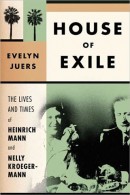 Juers’ book, which tracks the lives of brother-writers Heinrich and Thomas Mann, Heinrich’s wife, Nelly, and their social circle with both heavy research and significant use of imagination, has garnered some of the most positive and engaged reviews of the year. In the Guardian, James Lasdun begins: “Two questions are likely to occur to readers as they navigate the cross-currents of biographical data that surge through Evelyn Juers’ House of Exile. What exactly am I reading? And why is it so enthralling?”
Juers’ book, which tracks the lives of brother-writers Heinrich and Thomas Mann, Heinrich’s wife, Nelly, and their social circle with both heavy research and significant use of imagination, has garnered some of the most positive and engaged reviews of the year. In the Guardian, James Lasdun begins: “Two questions are likely to occur to readers as they navigate the cross-currents of biographical data that surge through Evelyn Juers’ House of Exile. What exactly am I reading? And why is it so enthralling?”
Robert McCrum, also in the Guardian, also uses the word enthralling. “This is a book that makes big demands for correspondingly sublime rewards,” McCrum writes. “[A] bold, inventive and often haunting threnody for European letters in a terrible century. Much more than a collective biography, it is really an unconscious act of homage to the great German writer not mentioned in its pages, W.G. Sebald.”
Though the book spans many years (reaching back more than a century for some extended passages), the central moment around which it revolves is the 1940s, when German artists fled their home country. Martin Rubin says, “There have been many portraits of the refugee culture in Los Angeles during the 1940s — e.g., Anthony Heilbut’s Exiled in Paradise (1983) and Ehrhard Bahr’s Weimar on the Pacific (2007) — but none quite like this. It is the great strength of Ms. Juers’ study that she puts her lost-soul subjects in the context of a worldwide phenomenon of dislocation.”
Lasdun says Juers employs a “risky but often richly rewarding associative method.” (Seventy-five pages in myself, I’m not sure any reviewer has emphasized just how much of that method involves essentially fictionalizing moments and thoughts that couldn’t be known to Juers.)
Frederic Raphael is not as taken as some — he thinks the appearances of Virginia Woolf don’t quite work, for one thing, and also says, “On the few occasions when Juers ventures into adding color of her own, it proves her wisdom in not doing it a lot” — but he calls the book “full of good and poignant things” and judges Juers’ approach “largely successful . . . a vibrant patchwork.”
John Simon is perhaps least impressed. He says the lives of Heinrich and Nelly “could make for a wonderful book if the author exercised sufficient self-control rather than showing off in various ways, and kept the work reasonably concise. Unfortunately, Evelyn Juers’ House of Exile is not, or not quite, that book.” He’s most mystified by the “countless passages” about Woolf and her husband, “cropping up seemingly out of nowhere, [going] on for pages…”
Michael Hoffman is the leader of the enthusiastic crowd. Writing in April 2009, when the book had only been published in Australia, he said, “House of Exile is an extraordinary book, and a really rare accomplishment. . . . It’s a very personal book: idiosyncratic, a little wandering, and finally scintillating and rather magical and a triumph. . . . A third of the way into her book, with Hitler in power, and exile the order of the day, Juers evolves a different method. She has largely assembled her personnel by now; she confines herself to giving updates, going from one to another in strictly chronological order, each chapter is a calendar year, and this is where her book . . . really comes into its own, so that I would wish it many thousands of readers. . . . It is amazing how those years, and those people, and those dramas all live in her pages.”
House of Exile: The Lives and Times of Heinrich Mann and Nelly Kroeger-Mann by Evelyn Juers
Farrar, Straus and Giroux, 400 pp., $30.00

